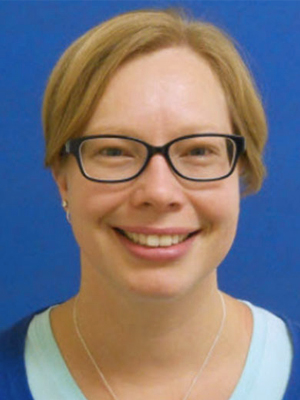
Sigrid Burruss, MD
What is your name, title, and job position?
Sigrid Burruss, Assistant Professor of Surgery. Co-Director of Surgical Intensive Care Unit.
In what clinical settings do you work?
I work in the Surgical Intensive Care Unit (SICU) and with trauma and emergency general surgery (EGS) patients.
What makes your job so special?
I have the opportunity to work with a fantastic group of people while providing care to patients who unexpectedly come to the hospital after an injury or sudden illness. Patients don’t typically want to be in the hospital and it is our responsibility in Trauma, Emergency General Surgery and Surgical Critical Care to care for these patients from hospital admission to discharge. These are some of the sickest patients in the hospital and with critical care training we have the knowledge and skill to care for them and provide them the best chance of recovery. In addition the COVID-19 pandemic has shown us the unpredictable nature of disease but also the versatility of our skills where we are able to provide critical care to patients while other providers were having to close clinics and operating rooms.
What is a typical day and week in your practice?
There is not typical day or week in trauma and critical care. That unpredictability is part of the appeal for me. A Friday night may be quiet and a random Tuesday may end up in a mass casualty event. With that in mind though our schedules include at least one week of Acute Care Surgery call (trauma and emergency general surgery) and one week of SICU call as well as night calls throughout the month. The rest of our time is spent with teaching, research, trauma prevention efforts, and many other activities.
Most rewarding aspect of your specialty?
I get to work with some amazing people including the residents and medical students who are always curious and challenge us to keep doing better.
Most challenging aspect of your specialty?
Our patients do not always do as well as hoped for and sharing that grief with family can be challenging.
Any unique challenges faced in your specialty?
The COVID-19 pandemic has created significant new challenges within Critical Care as a whole. We all took on a higher work load including the nursing staff while facing our own stressors in life. With that in mind we have all needed to reflect more on our work life balance and find ways to cope with these new stresses.
What is the lifestyle (work-life balance) of a physician in your specialty?
It depends on the day. When I’m on call then I am here at the hospital but when I’m not scheduled for clinical responsibilities I have some flexibility in how I spend my time. That may include teaching or working on quality improvement projects but if something important arises such as my daughter’s dance show or my son’s art class then I have the flexibility to be there. I also have great partners that should life throw some unexpected turns that we are all there to help each other out.
Did you do any additional fellowship training after and why?
I did a Trauma and Surgical Critical Care fellowship at UCSD in order to gain the expertise to provide continuity of care for my trauma and EGS patients from ED to OR to SICU to floor and then home.
Why did you choose to work at Loma Linda University Health?
Loma Linda encompasses the values I believe in. This includes not just providing excellent care while the patient is in the hospital but also focusing on social determinants of health and prevention efforts. We must always ask what we can do better and Loma Linda supports and promotes this concept of whole person care.
